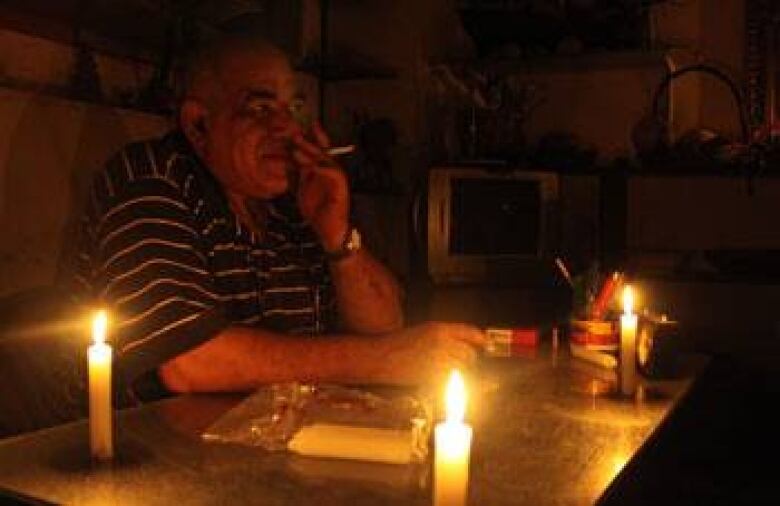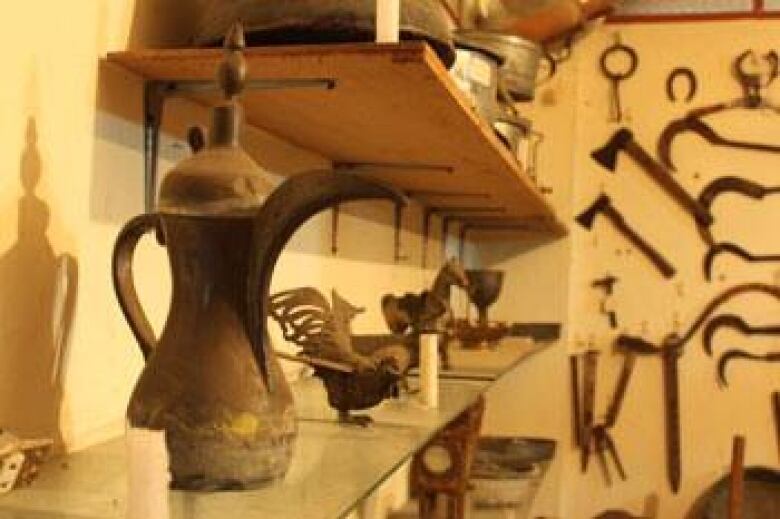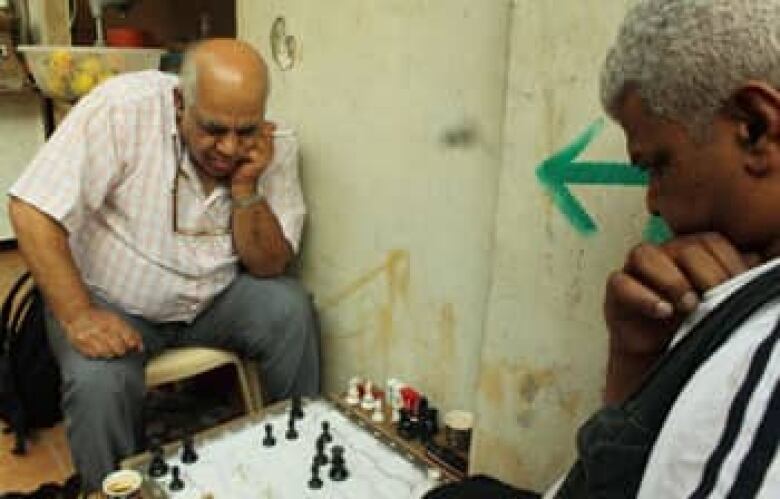DAY 4: Artifacts of exile
Nov. 7, 2010 If every society has a historian, then Shatila's must be Dr. Mohammed Al-Khatib.
A medical doctor, Al-Khatib has taken it upon himself to write about the camp's violent history. But his main body of work isn't on paper: It is an airless, dark warehouse crammed with reminders of his people's past.
When we first met up with himSaturdaynight, the power had gone out in Shatila, as it does every few hours, every single day. Few people have generators, and when the lights go out, most of Shatila's dwellings fall into a remarkable darkness.

So, it was by candle light that we started our conversation.
"I don't have children,"Al-Khatib said. "So, I said 'OK, this is my child, and I have to pay for it'."
His "child" is Shatila's one and only museum: a dusty two rooms full of mostly pre-1948 Palestinian artifacts brought by their owners when they came to Lebanon. Al-Khatib started gathering them from Palestinian refugee camps all over Lebanon about seven years ago and has amassed more than 900 items since.
But with little light, we couldn't see much of themSaturdaynight. So, we agreed to meet in the morning before the power went out again.
Al-Khatib and several lit incandescent bulbs were waiting for us when we arrived Sunday to resume our chat.
"It is important to remember the way of living there [pre-1948 Palestine]," he continued. "We also had a culture in Palestine like any other country."

Each item brings on a story.A key from Al-Khatib's home village of Khalsa, in the north of what was then Palestine, once belonged to a homeowner who had assumed he'd have the chance to unlock his door again. Aminiature ship had been kept and repaired by the friends of a sailor in his memory. A mirror encased in ornate wood had travelled from a Palestinian home to Gaza, to Egypt and then was given as a gift to a doctor in Beirut before ending up in Al-Khatib's museum.
His favourite item?
"The newest is always the most precious," he says with a smile.
Al-Khatib isn't bothered that few Palestinians come to explore the museum, that few organizations have offered to help him despite his repeated requests.
Nahlah Ayed's Shatila blog
- Day 1: En route to Beirut
- Day 2: Small signs of Progress
- Day 3: Sharing details, but with dignity
- Day 4: Artifacts of exile
- Day 5: Shatila's space problem
- Day 6: Camp politics
- Day 7: A litany of woes
- Day 8: Talking about Arafat
- Day 9: Dreaming big in Shatila
- Day 10: Living with the trauma of camp life
- Day 11: Celebrating sacrifice in Shatila
- Day 12: Stuck in Shatila
Like most of the camp's residents,Al-Khatib's time in Lebanon's camps, which began in 1947when his family fled what was then Palestine when he was six months old, defined the course of his 63 years:his father was killed in a camp in the south, and, tragically, his own two children died of illness and hunger in Shatila during the so-called War of the Camps phase of the Lebanese civil war in 1985 and '86, in which the Shia Muslim Amal militia sought to gain control of the Palestinian camps in Beirut and southern Lebanon.
He narrowly escaped death during the Sabra and Shatila massacre in 1982.
Despitegrowing upinpoverty, Al-Khatib earned a medical degree in Spain before returning to Shatila to work as a physician with the United Nations. Eventually, unlike most Palestinians here, he acquired Lebanese citizenship and moved out of Shatila.

It was education, he says, that really gave him a way out.
So, he finds it hard to watch as many of today's youth drop out of school, some of them, he says, spending their days playing cards instead.
Al-Khatib prefers chess. And it is those heated matches, his family and the museum that keep him coming back to Shatila.
It doesn't happen often, but he loves it when someone in the camp beats him at chess. Because, he says, he wants better for the people of Shatila that they're capable of doing more to improve their fortunes.
"I always stress on education and culture," he says. "Even if you are poor, you can still study."
"Yes, there is hope. In every society, there is hope."
And in every society, there are the hopeful. Al-Khatib is definitely one of them.
[IMAGEGALLERY galleryid=131 size=large]













_(720p).jpg)


 OFFICIAL HD MUSIC VIDEO.jpg)
.jpg)



























































































